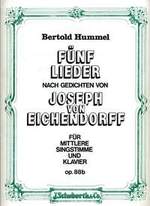Five Songs after poems by Joseph von Eichendorff for Medium Voice and Piano, op. 88 b (1988)

I. Aus schweren Träumen
II. Der wandernde Musikant
III. Kurze Fahrt
IV. Unfall
V. Todeslust
First
performance: march 9, 1988, Würzburg, Hochschule für Musik
Martin
Hummel / Ernst Ueckermann
Duration: 13 Minutes
Publisher: Schott Music ED 20286 / ISMN: M-001-14991-4
| II. Der wandernde Musikant | IV. Unfall | V. Todeslust |
Printing
errors in this edition:
Page 11 ("Unfall"), 1st bar, left
hand: treble clef instead of bass clef
Page 11("Unfall"), 3rd system,
last bar, left hand: treble clef instead of bass clef; right hand, chord on beat
four: mf with accent
Page 17 ("Todeslust"), 4th system, 1st bar:
f mf instead of fp
The order of the songs given here was recommended by the composer for performance as a cycle.
These songs were written for the 200th anniversary of the poet J. v. Eichendorff (1988) and represent the attempt to get close in our times to the original "tone" of the poems - not with a repeated strophic melody but in "song-scenes", in "little dramas", in which the piano characterises in subtle ways the text just being sung.
Bertold Hummel
"Aus schweren Träumen" ("From burdensome dreams") is significantly placed at the beginning of the latest Hummel cycle (1988) on poems by Joseph von Eichendorff, for the poet had this very verse as the motto at the beginning of his "Romanzen" ("Romances"). Setting Eichendorff after Schumann was for Hugo Wolf a great challenge. He therefore emphasised, in contrast to Schumann, Eichendorff's realistic and humorous side. Bertold Hummel does the same in "Der wandernde Musikant" ("The wandering musician") and in "Unfall", songs marked by love for the violin. In the latter, the composer extracts much more grotesque results from the unexpected encounter with Amor and his arrow than Hugo Wolf with his leisurely setting. Here, frequent changes of time signature as well the often rapid transitions to the extremities of the piano's range contribute to the effect.
But it is not the serious motto alone that sounds the "right fundamental tone" for this cycle (in the last seven bars of "Aus schweren Träumen", the note A is circled by the vocal line and the piano, until it finally asserts itself as a held bass note): in "Kurze Fahrt" ("Short journey") and in the closing "Todeslust" ("Hunger for death"), ultimate feelings find strong expression. The "right fundamental tone" (D) of this final song - basis for the evocation of the "wunderbaren Nacht" ("wonderful night") - finally leaves the deep regions and fades away in the bright middle range of a widely spread D major in first inversion. Although a pure triad, it leaves - as in most of Hummel's songs -the cadence open.
Wolfgang Osthoff (in "Zu den Liedern Bertold Hummels", Tutzing 1998)
Aus
schweren Träumen
Aus
schweren Träumen
fuhr
ich oft auf
und sah durch Tannenwipfel
den Mond ziehn über stillem Grund
und sang
vor Bangigkeit und schlummert' wieder ein. -
Ja,
Menschenstimme, hell aus frommer Brust!
Du bist doch die gewaltigste, und
triffst
den rechten Grundton, der verworren anklingt
in all den tausend
Stimmen der Natur!
Der
wandernde Musikant
Bist
du manchmal auch vertimmt,
drück dich zärtlich an mein Herze,
dass mir's fast den Atem nimmt,
streich und kneif ich in süßem
Scherze,
wie ein rechter Liebestor
lehn' ich sanft an dich die Wange,
und du singst mir fein in's Ohr.
Wohl im Hofe bei dem Klange
Katze
miaut, Hund heult und bellt,
Nachbar
schimpft mit wilder Miene —
doch
was kümmert uns die Welt,
süße,
traute Violine!
Kurze
Fahrt
Posthorn, wie so
keck und fröhlich
Brachst
du einst den Morgen an,
vor
mir lag's so frühlingsselig,
dass
ich still auf Lieder sann.
Dunkel
rauscht es schon im Walde,
wie
so abendkühl wird's hier,
Schwager,
stoß in's Horn - wie balde
Sind
auch wir im Nachtquartier!
Short
journey
Posthorn, how jauntily and merrily
you once brought on the morning;
it
lay before me with such spring bliss
that I thought silent songs.
The forest is already murmuring darkly,
and how evening-cool it is becoming
here;
coachman, blow your horn - how soon
we too will find our night lodgings!
Translation from German to English copyright © by Emily Ezust
Unfall
Ich ging bei Nacht einst
über Land,
ein Bürschlein traf ich draußen,
das
hat 'nen Stutzen in der Hand
und
zielt auf mich mit Grausen.
Ich
renne, da ich mich erbos'
auf
ihn mit vollem Rasen,
da
drückt das kecke Bürschlein los
und
ich stürtz auf die Nasen.
Er
aber lacht mir in's Gesicht,
dass
er mich angeschossen.
Cupido
war der kleine Wicht —
Das
hat mich sehr verdrossen.
Mishap
Once
I was walking in the country at night
and met a young lad out there:
he
had a rifle in his hand
and aimed it at me, full of menace.
I ran
at him - I was so angry -
ran at him in full rage,
but the saucy lad let
loose
and I fell on my nose.
He laughed in my face
for having
shot me;
Cupid was this little creature -
and that has annoyed me to no
end.
Translation from German to English copyright © by Emily Ezust
Todeslust
Bevor er in die blaue Flut
gesunken,
träumt noch
der Schwan und singet todestrunken;
die
sommermüde Erde im Verblühen
läßt
all ihr Feuer in den Trauben glühen;
die
Sonne, Funken spühend, im Versinken,
gibt
noch einmal der Erde Glut zu trinken,
bis,
Stern auf Stern, die Trunkne zu umfangen,
die
wunderbare Nacht ist aufgegangen.